|
|
|
Sort Order |
|
|
|
Items / Page
|
|
|
|
|
|
|
| Srl | Item |
| 1 |
ID:
134072
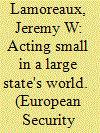

|
|
|
|
|
| Publication |
2014.
|
| Summary/Abstract |
The interest in small states ebbs and flows as important international affairs include small states. Russia's actions and policies vis-à-vis Ukraine, and the resultant intensified apprehension among Russia's smaller neighbours, aim the proverbial microscope at the size and power discrepancies between states. Russia, by most metrics, is a large state and the Baltic states, by those same metrics, are small states. Small-state scholars expect large and small states to act differently. However, the case of Russia and the Baltic states indicates that large and small states do not, in fact, act all that different. This being the case, this article calls into question many of the assumptions made by small-state scholars about the difference between large- and small-state action and argues for changes within small-state studies as a subdiscipline of the larger international relations discipline.
|
|
|
|
|
|
|
|
|
|
|
|
|
|
|
|
| 2 |
ID:
124321
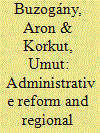

|
|
|
|
|
| Publication |
2013.
|
| Summary/Abstract |
Starting from the empirical observation of high levels of absorption of EU cohesion funds but strikingly low levels of substantive change in regional cohesion, this essay offers a contextual analysis of regional development policies in Hungary. Based on theoretical frameworks dealing with Europeanisation, new regionalism and participative development, it explores the reasons for this observation by analysing the role of administrative and planning structures and of development discourses. The essay shows that the Europeanisation of regional development policy triggered several changes in the planning process and led to the partial inclusion of new actors. However, the main effect of this was a growing centralisation of development policy making. The essay explains this by pointing to the domestic political context and the historical foundations of regional development discourses of the conservative and leftist liberal parties. While there are overlaps between the discourses on both sides of the ideological divide, they are perceived as incompatible by political actors. Thus, it is argued that considerations of political power, rather than ideological nature, shape Hungarian regional and development policy and explain the incremental reform process.
|
|
|
|
|
|
|
|
|
|
|
|
|
|
|
|
| 3 |
ID:
128127
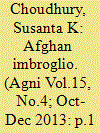

|
|
|
|
|
| Publication |
2013.
|
| Summary/Abstract |
The 11 September attacks in the United States caused NATO to invoke article 5 of the NATO charter for the first time in history. The article states that an attack on any member shall be considered to be attack on all. The invocation was confirmed on 4 October 2001 when NATO determined that the attacks were indeed eligible under the terms of North Atlantic Treaty Organisation, Eagle Assist and Operation Active Endeavour, a naval operation in the Mediterranean sea and is designed to prevent the movement of terrorists or weapons of mass destruction as well as to enhance the security of shipping the general which began on 4 October 2001.
|
|
|
|
|
|
|
|
|
|
|
|
|
|
|
|
| 4 |
ID:
131852
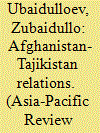

|
|
|
|
|
| Publication |
2014.
|
| Summary/Abstract |
This article attempts to touch upon the relations between Afghanistan and Tajikistan, two neighboring countries, from the historical perspective and the current period. The article analyses the history of Afghanistan-Tajikistan relations during and after the Soviet era, especially during the Afghan Mujahideen's struggle against the Soviet occupational army and Taliban regime in Afghanistan, the Tajikistan civil war of 1992-1997, and after September 11, 2001. In addition, the issues of the ethnic Tajiks in Afghanistan, the violent and vulnerable Tajik-Afghan border, the withdrawal of NATO troops from Afghanistan in 2014 and its impact on Afghanistan-Tajikistan relations, and the new phase of economic relations and an effective cooperation between the both countries are discussed. The article tries to fill the gaps within the body of existing literature and understanding concerning the topic.
|
|
|
|
|
|
|
|
|
|
|
|
|
|
|
|
| 5 |
ID:
133281
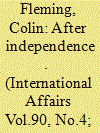

|
|
|
|
|
| Publication |
2014.
|
| Summary/Abstract |
The Scottish government's white paper on independence, Scotland's future, sets out its defence blueprint following a 'yes' vote. It makes clear that its defence plans would be subject to a Strategic Defence and Security Review in 2016, as well as negotiation on the division of assets with London. However, it also provides a strong indication of how it envisages its defence posture as an independent state-a major pillar of which is founded upon strong and continued defence cooperation with the rest of the United Kingdom. Is this a realistic assumption? And, if so, how would it work in practice? Contextualized by the increased emphasis on defence cooperation which sits at the heart of NATO's Smart Defence initiative, as well as the European Defence Agency's 'pooling and sharing' programme, the article assesses the benefits and challenges that might be encountered in a defence cooperation agreement between an independent Scotland and the rest of the United Kingdom in the event of a 'yes' vote in September's referendum.
|
|
|
|
|
|
|
|
|
|
|
|
|
|
|
|
| 6 |
ID:
134217
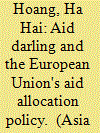

|
|
|
|
|
| Publication |
2014.
|
| Summary/Abstract |
This paper analyses the motivation determining the European Union's (EU) aid allocation to Vietnam. Existing literature and EU official documents are used to build upon four models with respect to new aid allocation: donor interest, recipient interest, recipient capacity and potential donor influence. The paper concludes that the EU's aid policy in Vietnam has a long-term objective in conformity with Vietnam's development strategy-poverty alleviation. Moreover, the EU's political and economic interests, a successful economic reform and development strategy, a high level of ownership (good governance) and potential donor influence are identified as contributions to make Vietnam an 'aid darling'.
|
|
|
|
|
|
|
|
|
|
|
|
|
|
|
|
| 7 |
ID:
132326
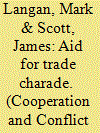

|
|
|
|
|
| Publication |
2014.
|
| Summary/Abstract |
Aid for Trade (AfT) has gained prominence as an innovative form of donor support in the 'post'-Washington Consensus. AfT mechanisms have been praised as a means of aligning trade liberalisation deals (whether in the Doha Round or within bilaterals) to poverty reduction objectives. This article, through critical analysis of AfT discourse within the 'moral economies' of multilateral World Trade Organization and bilateral European Union-African, Caribbean and Pacific negotiations, points to the strategic purposes of donor language in rationalising asymmetric North-South trade systems. Moreover, it questions the 'development' credentials of AfT assistance by examining some of the ensuing private sector activities and the impact on the supposed beneficiaries, and the tying of AfT disbursements to the implementation of inappropriate policies.
|
|
|
|
|
|
|
|
|
|
|
|
|
|
|
|
| 8 |
ID:
134097
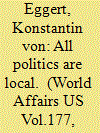

|
|
|
|
|
| Publication |
2014.
|
| Summary/Abstract |
Let us drink to Putin! He is doing so many good things for us." This toast from a friend's mother, at a recent friendly gathering of neighbors at my dacha near Moscow, made a few of us around the table feel a little uneasy. I think it was the first time that I'd heard someone proposing to drink the health of one of our heads of state when it wasn't required by protocol. However, this lady's emotions were sincere and, given the circumstances in Russia today, quite logical. Vladimir Putin's Crimean blitz was a very domestic Russian affair, designed to give the people a new sense of imperial pride and, by extension, provide the Kremlin with a badly needed popularity boost. In this regard, it succeeded beyond expectation. Even the tragedy of Malaysia Airlines Flight 17 did not shake the foundations of the conviction that most Russians hold: their country is a beacon of moral fortitude and spiritual greatness besieged by the Western forces of atheism, permissiveness, and greed.
|
|
|
|
|
|
|
|
|
|
|
|
|
|
|
|
| 9 |
ID:
132417
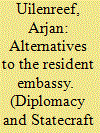

|
|
|
|
|
| Publication |
2014.
|
| Summary/Abstract |
Increasingly integrated in a common political entity, the European Union's member states are exploring new avenues to shape and maintain their mutual relations. This analysis describes three alternatives to the traditional resident embassy by which ministries of foreign affairs within the EU attempt to maintain diplomatic networks. The models discussed are secondments within member states' capitals, visiting ambassadors, and co-location and co-operation. In other words, with regard to different modes of representation, member states can consider diving in, stepping back, or pooling and sharing. These developments shed light on the ways in which the diplomatic machineries of the member states are trying to adapt to the demands of a "post-Westphalian" environment such as that of the EU.
|
|
|
|
|
|
|
|
|
|
|
|
|
|
|
|
| 10 |
ID:
125643
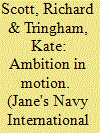

|
|
|
|
|
| Publication |
2013.
|
| Summary/Abstract |
The rebuilding of the Turkish naval forces command's specialist amphibious shipping capability is running hand in hand with efforts to develop the indigenous maritime industrial base.
|
|
|
|
|
|
|
|
|
|
|
|
|
|
|
|
| 11 |
ID:
134074
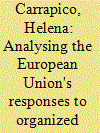

|
|
|
|
|
| Publication |
2014.
|
| Summary/Abstract |
In the past 30 years, organized crime (OC) has shifted from being an issue of little, or no concern, to being considered one of the key security threats facing the European Union (EU), the economic and political fabric of its society and its citizens. The purpose of this article is to understand how OC has come to be understood as one of the major security threats in the EU, by applying different lenses of Securitization Theory (ST). More specifically, the research question guiding this article is whether applying different ST approaches can lead us to draw differing conclusions as to whether OC has been successfully securitized in the EU. Building on the recent literature that argues that this theoretical framework has branched out into different approaches, this article wishes to contrast two alternative views of how a security problem comes into being, in order to verify whether different approaches can lead to diverging conclusions regarding the same phenomenon. The purpose of this exercise is to contribute to the further development of ST by pointing out that the choice in approach bears direct consequences on reaching a conclusion regarding the successful character of a securitization process. Starting from a reflection on ST, the article proceeds with applying a "linguistic approach" to the case study, which it then contrasts with a "sociological approach". The article proposes that although the application of a "linguistic approach" seems to indicate that OC has become securitized in the EU, it also overlooks a number of elements, which the "sociological approach" renders visible and which lead us to refute the initial conclusion.
|
|
|
|
|
|
|
|
|
|
|
|
|
|
|
|
| 12 |
ID:
134082
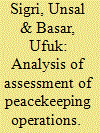

|
|
|
|
|
| Publication |
2014.
|
| Summary/Abstract |
This article proposes a model for assessment of peacekeeping operations. Peacekeeping operations began in 1948, under the authority of the United Nations in order to provide and sustain a peaceful environment throughout the world. International organizations such as the United Nations, the North Atlantic Treaty Organization and the African Union undertake peacekeeping operations in different geographical regions of the world. However, they lack some aspects of the assessment process. There were studies conducted previously in order to determine the principles of the assessment process of peacekeeping operations but none of them presented a comprehensive solution. Therefore, in this study, a clear, comprehensive and detailed assessment model was proposed, which may be applied in future peace operations and shed more light on the subject for future researches.
|
|
|
|
|
|
|
|
|
|
|
|
|
|
|
|
| 13 |
ID:
133456
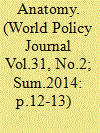

|
|
|
|
|
| Publication |
2014.
|
| Summary/Abstract |
Alternative currency is a privately developed form of money that is used as a substitute to national currency in designated areas. It is not regulated by national governments or banks. A familiar example is the e-currency, Bitcoin. However, Bitcoin is neither the only nor the oldest example of alternative money. The chiemgauer, Brixton pound, sardex, and the dam are examples of alternative money currently in use in Germany, England, Italy, and the Netherlands, respectively. The goal with these currencies is to promote the idea of spending locally. By keeping the currency within the designated area, the local economy is able to prosper regardless of the state of the national economy. This enables communities to establish local markets that are less affected by national trends
|
|
|
|
|
|
|
|
|
|
|
|
|
|
|
|
| 14 |
ID:
130322
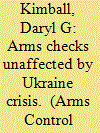

|
|
|
|
|
| Publication |
2014.
|
| Summary/Abstract |
Although the widening confrontation over the political future of the Crimean peninsula and other parts of the former Soviet Union has ruptured already-strained relations between Moscow and the West and put at risk the implementation of some nuclear risk-reduction initiatives and agreements, Russia is not planning to stop allowing the on-site inspections required under the 2010 New Strategic Arms Reduction Treaty (New START), Russian officials said last month. To protest Russia's actions to take control of Crimea, the seven non-Russian members of the Group of Eight (G-8) industrialized countries have suspended Russia's membership in the group. As part of that decision, the seven countries-Canada, Italy, France, Germany, Japan, the United Kingdom, and the United States-changed the location of their planned June summit from Sochi to Brussels. The Russian actions in Crimea have disrupted planning for the activities of the Global Partnership against the Spread of Weapons and Materials of Mass Destruction, which the G-8 launched in 2002.
|
|
|
|
|
|
|
|
|
|
|
|
|
|
|
|
| 15 |
ID:
130356
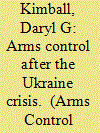

|
|
|
|
|
| Publication |
2014.
|
| Summary/Abstract |
The Global Nuclear Disarmament and risk reduction enterprise is at a crossroads as U.S.-Russian relations have reached perhaps their lowest point in more than a quarter century. Nevertheless, it remains in U.S. and Russian interests to implement existing nuclear risk reduction agreements and pursue practical, low-risk steps to lower tensions. Present circumstances demand new approaches to resolve stubborn challenges to deeper nuclear cuts and the establishment of a new framework to address Euro-Atlantic security issues.
Even before the recent political turmoil in Ukraine and Russian President Vladimir Putin's extralegal occupation and annexation of Crimea, relations between Moscow and Washington were chilly. Despite U.S. adjustments to its missile defense plans in Europe that eliminate any threat to Russian strategic missiles, Putin rebuffed U.S. President Barack Obama's proposal last June to reduce U.S. and Russian strategic stockpiles by one-third below the ceilings set by the New Strategic Arms Reduction Treaty (New START).
Moving forward will be difficult, but doing nothing is not an option. Through earlier crises during and after the Cold War, U.S. and Russian leaders pursued effective arms control and disarmament initiatives that increased mutual security and significantly reduced the nuclear danger. Much has been achieved, albeit too slowly, but there is far more to be done.
As the world's non-nuclear-weapon states persuasively argue, U.S. and Russian stockpiles still far exceed any plausible deterrence requirements, and the use of just a few nuclear weapons by any country would have catastrophic global consequences. As the 2015 Nuclear Nonproliferation Treaty (NPT) Review Conference approaches, pressure to accelerate action on disarmament will only grow.
For now, neither Russia nor the United States wants to scrap the existing arms control regime, including New START and the Intermediate-Range Nuclear Forces (INF) Treaty, which provide greater predictability and stability in an otherwise strained bilateral relationship. A return to a period of unconstrained strategic nuclear competition would not only deepen the distrust and increase dangers for both sides, but also would undermine the NPT. Scrapping the existing nuclear risk reduction measures would do nothing to protect Ukraine from further Russian aggression or reassure nervous NATO allies.
Unfortunately, the profound tensions over Ukraine delay the possibility of any formal, bilateral talks on nuclear arms reductions and missile defense. In light of these realities, Obama and other key leaders must explore alternative options to reduce global nuclear dangers and defuse U.S.-Russian strategic tensions.
|
|
|
|
|
|
|
|
|
|
|
|
|
|
|
|
| 16 |
ID:
128987
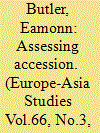

|
|
|
|
|
| Publication |
2014.
|
| Summary/Abstract |
On 1 May 2014, the European Union (EU) celebrated the tenth anniversary of the accession of ten member states-Cyprus, Czech Republic, Estonia, Hungary, Latvia, Lithuania, Malta, Poland, Slovakia and Slovenia. Of these ten new members, eight were Central and East European (CEE) countries that had, for most of the twentieth century, been governed by communist regimes either as republics of the Soviet Union (Latvia, Lithuania and Estonia), satellite states of the Soviet Union (Poland, Hungary, Czech Republic, Slovakia) or as a constituent republic of Yugoslavia (Slovenia). In the subsequent ten years three additional post-communist countries have acceded to the EU (Romania and Bulgaria in 2007 and Croatia in 2013). Commenting on the 2004 EU accession of the first eight former communist countries, the then Irish Prime Minister and President of the European Council, Bertie Ahern, wrote that there was
a particular historical resonance as eight of the former communist countries in the east have emerged from the shadows of the Iron Curtain to join us in working for common goals and for mutual benefit. The artificial divisions, which have blighted our continent's history for so long, are finally being laid to rest.1
|
|
|
|
|
|
|
|
|
|
|
|
|
|
|
|
| 17 |
ID:
131624


|
|
|
|
|
| Publication |
2014.
|
| Summary/Abstract |
European Union (EU) interventions in conflict countries tend to focus on governance reforms of political and economic frameworks instead of the geopolitical context or the underlying power asymmetries that fuel conflict. They follow a liberal pattern often associated with northern donors and the UN system more generally. The EU's approach diverges from prevalent governance paradigms mainly in its engagement with social, identity and socio-economic exclusion. This article examines the EU's 'peace-as-governance' model in Cyprus, Georgia, Palestine and Bosnia and Herzegovina. These cases indicate that a tense and contradictory strategic situation may arise from an insufficient redress of underlying conflict issues.
|
|
|
|
|
|
|
|
|
|
|
|
|
|
|
|
| 18 |
ID:
130606
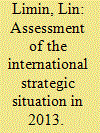

|
|
|
|
|
| Publication |
2014.
|
| Summary/Abstract |
The international strategic situation in 2013 appeared very calm than ever before and had no outstanding features; the fact of its having no special feature was its de?ning characteristic. Although 2013 could be
characterized as a normal year, the international strategic situation has undergone some profound changes. One of the most important is that the United States may have quietly given up its role of the "world police." The 'post-American era' has begun to arrive without attracting much attention in the international community. Many of these profound changes, including the long-term downturn of the world economy, the ongoing process of the West 's decline and the rise of the East, the endless chaos in the Middle East, readjustments in the international order and great power relations, and the evolving relationship between China and the U.S. are all closely related with this dawning of the 'post-American era.' Thus, the 2013
international strategic situation could be seen as holding the seeds of greater change than has been seen since the collapse of the Soviet Union in 1991.
|
|
|
|
|
|
|
|
|
|
|
|
|
|
|
|
| 19 |
ID:
127343
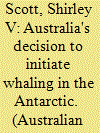

|
|
|
|
|
| Publication |
2014.
|
| Summary/Abstract |
On May 31, 2010, Australia instituted proceedings before the International Court of Justice in the case of Whaling in the Antarctic (Australia v. Japan). Although Australian politicians had for some time threatened such a course of action, the decision to proceed with international litigation took many observers by surprise, most basically because Japan appeared to be in a strong legal position and the risks associated with the case appeared greater than Australia's prospects for success. This article examines the background to the whaling dispute and suggests two ways in which litigation in the World Court may contribute to resolution of the dispute no matter the legal outcome of the case.
|
|
|
|
|
|
|
|
|
|
|
|
|
|
|
|
| 20 |
ID:
126586


|
|
|
|
|
| Publication |
2013.
|
| Summary/Abstract |
Using the 'achievement index', a country's relative size of gross domestic product divided by its relative size of population, I argue that the high-achieving position of the West, as a structural distortion, has been a principal source of instability in the modern international system. Rather than being just unsatisfied great powers, large high achievers and stagnant low achievers engage in hegemonic and counter-hegemonic warfare, respectively. Both hierarchy and balancing systems are structurally more stable if they are 'natural' and less stable if they are 'unnatural', with being natural defined as an achievement index of 1. The rise of the rest constitutes a long-term trend back to nature, beginning to flatten the heretofore skewed international structure, which lessens one source of modern system-level instability. With a much larger share of world population, China cannot rise to the same relative height as the West that rose with a much smaller share of the population. China's rise is thus unlikely to repeat the past experience of the rising West.
|
|
|
|
|
|
|
|
|
|
|
|
|
|
|
|
|
|
|
|
|